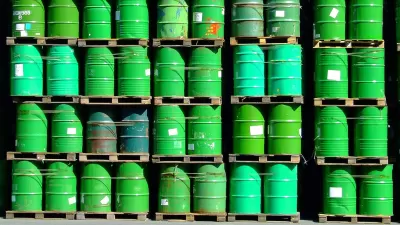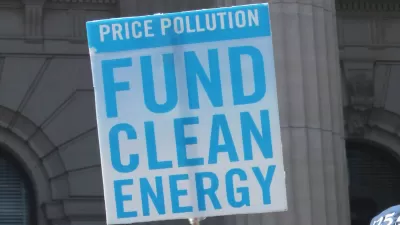President Obama, long opposed to increasing the gas tax, has proposed a $10-per-barrel oil fee to be paid by energy companies. It will fund his 21st Century Clean Transportation System to reduce carbon emissions and promote new vehicle technology.

Perhaps it's a result of the president being at the end of his second term that he finally proposes to tax fuel, even if it be in the indirect form of an oil fee, or perhaps the Paris COP21 accord reached last December is inspiring Obama to push the political envelope by taxing oil. In any case, the proposed $10-per-barrel oil fee should be welcome news among environmentalists and advocates for high-speed rail, public transportation, advanced vehicle technology, and infrastructure advocates who can look past concrete and asphalt, even if the proposal is likely to go nowhere.
"President Barack Obama is about to unveil an ambitious plan for a '21st century clean transportation system,'" writes Michael Grunwald, POLITICO's editor-at-large of The Agenda. "And he hopes to fund it with a tax on oil."
Obama aides told POLITICO that when he releases his final budget request next week, the president will propose more than $300 billion worth of investments over the next decade in mass transit, high-speed rail, self-driving cars, and other transportation approaches designed to reduce carbon emissions and congestion," writes Michael Grunwald. To pay for it all, Obama will call for a $10 “fee” on every barrel of oil, a surcharge that would be paid by oil companies but would presumably be passed along to consumers.
The proposal is noteworthy in at least two ways. First, the president has been steadfast in his refusal to raise the gas tax or consider a vehicle-mile traveled (VMT) fee (now commonly called a road usage charge, in deference to Oregon). Rather than increase user fees to fund his $302 billion, 4-year Grow America plan in 2014, it was funded with business tax reform, a type of repatriation tax.
Second, it deviates from the traditional road and bridge approach by focusing to a great extent on reducing carbon emissions. However, the White House Fact Sheet on the plan does indicate that the fee, "which would be gradually phased in over five years," would also provide "for the long-term solvency of the Highway Trust Fund to ensure we maintain the infrastructure we have."
As one might expect, Republicans did not take to kindly to the fee increase.
"The proposal — which follows the passage of a bipartisan transportation bill [FAST Act] last year — would have difficulty clearing the Republican-controlled Congress," writes Jacob Pramuk for CNBC. "In a statement, Rep. Steve Scalise [R] of Louisiana, House majority whip, said the House would quash the 'absurd' plan."
The House Energy & Commerce Committee took their disbelief a step further in their press release, suggesting Obama's proposal was actually from the satirical Onion newspaper.
The funding mechanism is not unprecedented
- Sen. Barbara Boxer (D-Calif), ranking member of the Environment and Public Works Committee, proposed a somewhat similar tax plan in the form of a wholesale oil tax in 2013, although it too went nowhere. It differed in that the tax would replace the gas tax, while Obama's fee would be in addition to the 18.4 cent federal gas tax, unchanged since 1993.
- Wholesale fuel sales taxes are a very popular funding mechanism for states, in addition to excise taxes and other user fees.
- In 2011, then-House Speaker Boehner proposed a bill to fill the shortfall from projected federal gas tax revenues with the royalties expected from new oil and gas drilling.
Hat tip to Akshai Singh of Ohio for Transportation Choice.
FULL STORY: Obama to propose $10-a-barrel oil tax

Alabama: Trump Terminates Settlements for Black Communities Harmed By Raw Sewage
Trump deemed the landmark civil rights agreement “illegal DEI and environmental justice policy.”

Study: Maui’s Plan to Convert Vacation Rentals to Long-Term Housing Could Cause Nearly $1 Billion Economic Loss
The plan would reduce visitor accommodation by 25% resulting in 1,900 jobs lost.

Planetizen Federal Action Tracker
A weekly monitor of how Trump’s orders and actions are impacting planners and planning in America.

Wind Energy on the Rise Despite Federal Policy Reversal
The Trump administration is revoking federal support for renewable energy, but demand for new projects continues unabated.

Passengers Flock to Caltrain After Electrification
The new electric trains are running faster and more reliably, leading to strong ridership growth on the Bay Area rail system.

Texas Churches Rally Behind ‘Yes in God’s Back Yard’ Legislation
Religious leaders want the state to reduce zoning regulations to streamline leasing church-owned land to housing developers.
Urban Design for Planners 1: Software Tools
This six-course series explores essential urban design concepts using open source software and equips planners with the tools they need to participate fully in the urban design process.
Planning for Universal Design
Learn the tools for implementing Universal Design in planning regulations.
Caltrans
Smith Gee Studio
Institute for Housing and Urban Development Studies (IHS)
City of Grandview
Harvard GSD Executive Education
Toledo-Lucas County Plan Commissions
Salt Lake City
NYU Wagner Graduate School of Public Service



























